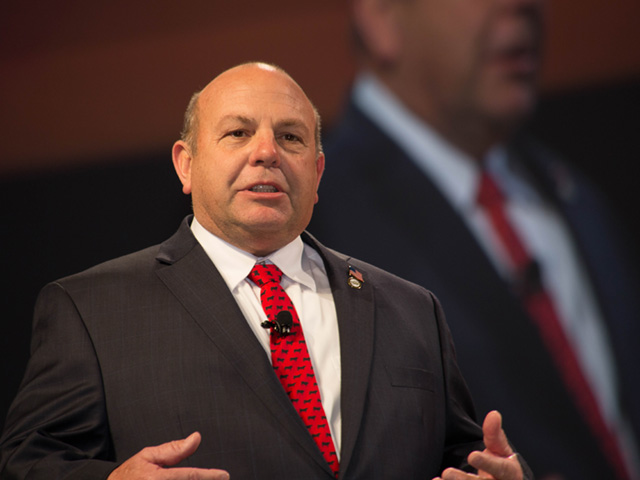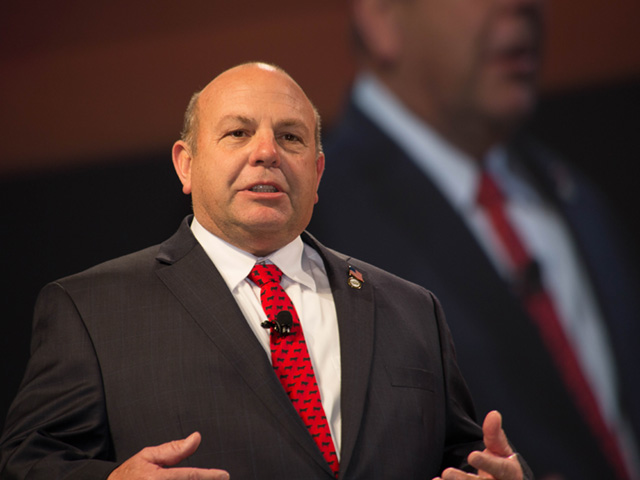Ag Policy Blog
American Farm Bureau Urges House Members to Oppose Build Back Better Act
Citing inflationary concerns and indirect tax increases that could affect farmers, the American Farm Bureau Federation on Tuesday urged members of the House of Representatives to vote against the social-spending bill supported by President Joe Biden, the "Build Back Better Act."
The House of Representatives is expected to vote on the bill later this week. Its mix of social programs, climate initiatives and tax policy changes are projected to cost roughly $2 trillion over the next decade. The Congressional Budget Office is expected to provide some details before the end of the week on how the bill would impact the annual budget deficit and long-term national debt. Republicans are unified in their opposition to the Build Back Better Act, but House passage will depend on how moderate Democrats are swayed.
Farm Bureau said the bill would hurt rural America.
Zippy Duvall, president of AFBF, stated in the letter that the Build Back Better Act "raises taxes and spends more taxpayer money at a time our country can afford to do neither."
Duvall stated inflation is increasing costs around the country "and greatly increased federal spending is a contributing factor. Federal policy choices have raised energy prices, leading to higher costs for everything from food to used cars. And yet this legislation will further exasperate that pain through a methane tax on oil and gas."
Farm Bureau's letter pointed to the 6.2% increase in inflation this year, citing that the Consumer Price Index is at a 31-year high.
"Inflation is a hefty tax on every American's paycheck."
Farm Bureau also pointed to provisions in the bill that would increase fines and penalties as much as ten times for violations of the Occupational Safety and Health Act, the Fair Labor Standards Act, and Migrant and Seasonal Agricultural Worker Protection Act.
Agricultural provisions in the Build Back Better Act include $87.4 billion in total spending over the next decade, including $28 billion for conservation programs; $27 billion for forestry; $18 billion for rural development; $12 billion for farmer debt relief; and $2 billion for agricultural research.
The bill also includes $960 million in biofuel grants, as well as funding for sustainable fuels and a new tax credit for those programs.
P[L1] D[0x0] M[300x250] OOP[F] ADUNIT[] T[]
A White House released fact sheet on rural communities champions the "landmark new program," the Rural Partnership Program, which will provide $970 million for states and tribes to use for competitive rural economic grant programs.
On taxes, the bill changes the current 21% rate, and provides a tax cut to 18% for corporations with taxable income below $400,000. The tax is increased to 26.5% for corporations with incomes higher than $5 million. The bill also sets a minimum 15% corporate tax for companies that zero out their tax liability.
The bill also boosts the valuation benefit for farmland in estates under a provision known as Section 2032 A. The bill would raise the deduction levels of farm ground under the provision from $750,000 to $11.7 million.
Farm Bureau's letter added, "While some elements of the reconciliation package would benefit agriculture, the massive amount of spending and tax increases required to pay for the plan outweigh the gains we would see in rural America. Also, the manner in which they were crafted is concerning. The agriculture industry and the committees of jurisdiction have held to a long tradition of bipartisanship that we have seen erode over this past year. We hope this does not negatively impact future farm policy discussions.
Farm Bureau's full letter can be viewed at
Robert Bonnie Confirmed by Senate
The Senate on Tuesday voted to confirm Robert Bonnie as the Agriculture undersecretary for food production and conservation.
The vote was 76 to 19.
Bonnie, who has served as Agriculture Secretary Tom Vilsack's deputy chief of staff and senior climate adviser, is expected to play a key role in USDA's climate initiatives. Bonnie also served as Agriculture undersecretary for natural resources and environment in the Obama administration. In his work, Bonnie has written reports on climate change that included proposing the use of the Commodity Credit Corporation, USDA's line of credit at the Treasury, to address climate change problems.
"Democratic and Republican members alike praise Mr. Bonnie's extensive credentials and commitment to tackling the climate crisis and boosting farm income at the same time. He is well qualified for this position and will help carry out USDA's important mission," Senate Agriculture Committee Chairwoman Debbie Stabenow, D-Mich., said in a news release. "I am glad my colleagues and I came together on a bipartisan basis to confirm Mr. Bonnie."
"Robert Bonnie is no stranger to USDA, having previously served at the department during the Obama administration. During his previous tenure, Mr. Bonnie developed a reputation of listening to stakeholders, an approach I expect will continue as he is sworn in as undersecretary for farm production and conservation. I appreciate and support his commitment to advancing voluntary and incentive-based climate programs that stay within the bounds of existing law. I am committed to working with him to ensure the agencies he oversees make producer-driven decisions that help our farmers, ranchers and private landowners succeed," Sen. John Boozman, R-Ark., Senate Agriculture ranking member, said.
--DTN Political Correspondent Jerry Hagstrom
Chris Clayton can be reached at Chris.Clayton@dtn.com
Follow him on Twitter @ChrisClaytonDTN
(c) Copyright 2021 DTN, LLC. All rights reserved.






Comments
To comment, please Log In or Join our Community .